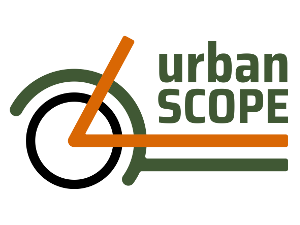7 partners (4 research-partners and 3 cities) across Europe are working closely together to implement the UrbanSCOPE project.
Széchenyi István University (consortium leader) 
The University’s predecessor in title, the Transportation and Telecommunication College of Technical Sciences was established in 1968. It has got university status since 2002 with two faculties. Year by year the university is expanding. Today Széchenyi István University has nine faculties, and four doctoral schools. The University provides education as well as research work in the fields of engineering – especially for the automotive industry, IT, architecture –, pedagogy, economics, environment, international relations, law and administration, agriculture and food sciences, social work, healthcare, and musical arts. Széchenyi István University’s quality is reflected not only in the national marketplace but also at the international level, as many multinational companies hire our graduates and work with our university. Its activities encompass training at all levels, from the vocational courses through the BSc and MSc to the doctoral training and MA programme. Over the last few years the internationalization of the University has also started offering twenty-four English-taught programmes. The University provides initial training leading to a BSc and MSc and PhD degree in various fields, offers post-graduate courses and carries out research, consultancy and other professional activities. Degrees (BSc, MSc, PhD) are issued after the successful completion of a program, after collecting the required number of credits, submission and defence of the final thesis. The credits at Széchenyi István University are ECTS conform credits. The institution – in accordance with the traditions – pursues predominantly applied research. Particular attention is paid to research activities that are multidisciplinary and fall within a scientific field. In addition to these activities, interdisciplinary projects that fall within the periphery of the fields of study at the university, which have a social and economic aspect to them and deal with critical problems, are also integrated into the research work of the university.
Technical University of Darmstadt 
Technische Universität Darmstadt (TUDa) is one of Germany’s leading technical universities. It has around 310 professors, 4,500 employees and 25.800 students devote their talents and best efforts to the significant future research fields; energy, mobility, communications and information technologies, housing and living conditions. Currently TUDa is/was participating in more than 100 EU-funded projects.
At TUDa the UrbanSCOPE project is carried out by the research group Urban Health Games (UHG). UHG investigates foundations and strategies of people-centred urban planning and urban design. As part of the Department of Architecture and adjunct to Multimedia Communications Lab (KOM), UHG members closely interact with environmental psychologists, computer scientists and serious games experts, collaborating with a wide range of academic and industry partners to sharpen research methods, connect higher education to local community challenges and maximize real world impact. UHG conducts research in the field of public space and neighborhood design, with its defining elements of open spaces, building typologies, mobility systems and pedestrian infrastructures, zoning, street surfaces and facades.
PRISMA Centre for Development Studies 
PRISMA is an interdisciplinary planning and research consultancy founded in 1991 and has since built up a notable record of research, regional and town structure and master plans, policy consulting, evaluation and education outcomes. PRISMA possesses extensive experience in lifelong learning research and action projects; local development; spatial/environmental planning; urban design; and the use of new technologies in learning, including school and adult learning. PRISMA has undertaken several projects as an advisor to the Greek Government in policy making for vocational education and training, regional planning, introduction of new technologies in public administration, study of the impact of EU-funded programmes on spatial planning, among other themes; and has also offered programme evaluation services, including the evaluation of operational programmes in Greece (e.g. OPs for continuing education and vocational training, the Information Society, Social Inclusion through lifelong learning, regional development of specific regions etc). PRISMA has also worked directly for the European Commission as a member of larger consortia (e.g. evaluation of HELIOS, Structural funds for SMEs, e-Content, Partnership Programme etc).
PRISMA has implemented a large number of transnational European projects, co-funded by the European Commission, in the field of environmental/spatial planning, urban design, lifelong learning, ecotourism, environmental conservation, cultural development and social inclusion, either as project coordinator or partner. More specifically, in the field of lifelong learning, over the past 20 years PRISMA conducted over 30 research studies or action/policy projects. Its transnational work on lifelong learning includes projects and publications in e-learning (setting up the Observatory of elearning in rural areas); validation and certification of non-formal and informal learning; participative planning and capacity building; the role of LLL in combating social exclusion; key skills development; competence and training needs assessment; the role of LLL and education in sustainable rural development; training for sustainable tourism and ecotourism quality labelling; conflict resolution between tourism and environmental planning.
Utrecht University 
Utrecht University is an internationally prominent, research-led university that carries out fundamental and applied research across a wide range of academic fields. Utrecht is ranked 51th in the world in the Shanghai 2017 ranking, and 67th in the world in the Leiden 2018 ranking. It is a member of LERU, the League of European Research Institutes. Utrecht University has over 30.000 students and
over 6500 staff. Its mission is to make a tangible contribution to societally relevant issues and to use its culture of interdisciplinary collaboration to solve such issues. Inspiration, ambition, independence and commitment are the core values defining the conduct and attitudes of its students and staff. UU are a recipient of the European Commission’s “HR Excellence in Research” award. The Department of Information and Computing Sciences has three divisions: Intelligent Software Systems, Algorithms, and Interaction, and performs world-class research in each. The Utrecht Center for Game Research is a university-wide center involving all seven faculties of the university, www.gameresearch.nl.
City of Győr 
Győr is a university city of 140,000 inhabitants, located half way between Budapest and Vienna, at the junction of the rivers Moson-Danube, Rába and Rábca. The city has always been a commercial
centre at the crossing of important roads, railways and rivers. In the last century it became one of the most important industrial centres (machine, textile, food and building industries) in Hungary. After 1990 development of Győr was very fast due to its location (close to the Austrian border), industrial traditions and qualified workforce. Industrial Park Győr has attracted more than 100 SMEs since 1992. The AUDI machinery factory was established in 1993, now it has become an automotive town. Cultural function is also strong in the city, its theatre and ballet company and the philharmonic orchestra is very well known in the wide region. Many festivals are organised year by year, such as the dance festival, the Győrkőc festival for children and the baroque festival. In 2002 the university was founded in Győr, and the city is dedicated to cooperate with the university, and also other cultural and sport institutions.
Győr city is committed to improve the quality of life of citizens and secure sustainable development. The municipality implements a large number of development projects co-financed by the Hungarian Government and the European Union. Infrastructure development with a focus on sustainable urban mobility has been an important issue over the last years in the city’s development strategy.
City of Darmstadt 
Darmstadt is a university city of 160,000 inhabitants including over 40,000 students, located in the southern part of Rhine-Main Metropolitan area including Frankfurt, Mainz and Wiesbaden. Darmstadt is home to many scientific institutions including the European Space Operations Centre (ESOC), the world known Facilities for Antiproton and Ion Research (FAIR), 3 universities and various high technology companies such as Merck and Software AG. The city of Darmstadt has won nationwide competition and grant to become “Digital City” strengthening its activities in developing, implementing and critically reflecting digital technology to improve people’s quality of life including mobility. The City of Darmstadt is dedicated to improve the cooperation between the municipality, institutions and citizens in order unfold education and job opportunities, improve the quality of life and secure a sustainable urban development.
Recently it started a major urban renewal project in the eastern part of the city, on the basis of an “Integrated Urban Development Concept (ISEK)”, which has been launched in late 2018. The ISEK provides a legal framework for realising projects and concrete measures of more than 20 Mio. Euro up to 2030. One aspect will be the implementation of sustainable solutions for urban mobility. In addition to that Darmstadt is restructuring motorized and pedestrian traffic to improve the quality of open spaces in the city centre. The city is also formulating a strategic masterplan for urban development “Darmstadt 2030”, in which sustainable mobility (i.e. increase of green modes) and the role of open spaces play a key role.
The City Planning Office of Darmstadt collaborates with the Department of Architecture at TUDa and contributes to the UrbanSCOPE project in providing access to a real world use case, in which the consortium partners will collaboratively develop and address research questions. It will create an environment for students to learn research and design techniques to support sustainable mobility as part of the curriculum.
City of Glyfada 
The Municipality of Glyfada is a municipal authority within the prefecture of Athens, Attica. Glyfada is a suburb of Athens, situated in the southern parts of the Athens Metropolitan Area. The area stretches from the foot of the Hymettus Mountain to the Saronicos Gulf. It is the largest of Athens’ southern suburbs. Its population numbers approx. 90.000 residents. Glyfada enjoys the benefits of a long waterfront, a vibrant metropolitan commercial and recreation centre and a modern business district, alongside the extended residential neighbourhoods. The popularity of the area, which attracts visitors from across the Athens basin creates often problems of traffic congestion and unauthorised parking in a large area. The Municipality has carried out a traffic study and the Master Plan of the area, in a systematic effort to plan future development in the City and handle the problems that have arisen in a proper way. Within this context, the Municipality has designed a network of cycling routes in the totality of its area and a system of pedestrian ways in the city centre, in an effort to encourage the residents to use their car less and undertake transport in alternative, more sustainable, ways. The Municipality of Glyfada has longstanding experience participating in medium & large-scale projects focusing on renewable energy sources and energy saving actions, as well as topics such as environmental awareness. Projects have been primarily supported through the European Union’s structural fund programmes, notably under the successive National Strategic Reference Frameworks (NSRF). The Municipality of Glyfada has signed the Covenant of Mayors, following a decision on 12-03-2014 by the City Council. The Covenant of Mayors is the main European movement involving local and regional authorities, who voluntarily commit to increase energy efficiency and use of renewable energy sources in their areas. By their commitment, Covenant signatories are intending to achieve and exceed the EU target of reducing CO2 emissions by 20% by 2020. Within this framework, the City has prepared the “Action Plan for Sustainable Energy” (A.P.S.E.) with specific environmental objectives, fostering ecological awareness among citizens and their awareness on environmental issues.
